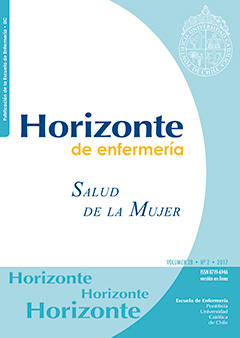Immigrant latino couples and postpartum contraception: Attitudes, perceptions, and sexual decision-making
Contenido principal del artículo
Resumen
Background: The number of Latinos in the US is increasing, and they are at higher risk for unintended pregnancies and short interpregnancy intervals. Purpose: This study examined immigrant Latino couples’ attitudes and perceptions towards contraception in relation to sexual decision-making. Methods: Pregnant Latinas and their partners (n=40 couples) were recruited from prenatal care clinics in the southeastern US. This was amixed-method study with a concurrent embedded strategy. Descriptive statistics, paired t-tests, interclass correlation, and the Actor-Partner Interdependence Model (APIM) were used to analyze the quantitative data. Data from open ended questions were analyzed with content analysis. Results: On the group-level analysis, men’s Contraceptive Attitudes and Perception Scale scores were significantly different from women’s in four key dimensions: partner (comfort in communicating with partner and partner's attitude), side effects, hassle, and cost (p<0.002, 0.046, 0.018, and 0.02). On the dyad-level analysis (between individual couples), no significant correlations were identified. In the dyad analysis using the APIM, only men’s contraceptive attitudes and perceptions were negatively associated with women’s sexual decision-making (β= −0.158, p = 0.005). Nearly two-thirds of the couples disagreed on postpartum contraceptive methods. Seven overlapping categories emerged as rationales for choosing specific postpartum contraceptive methods among men and women. Conclusions: Understanding the dyad-level influence on contraceptive attitudes/perceptions, sexual decision-making helps researchers, and practitioners design evidence-based, culturally tailored interventions to assist couples in choosing the best postpartum contraceptives for their family. Decreasing men’s contraceptive barriers by providing correct information may be the first step in mediating the dyad-level factor.
